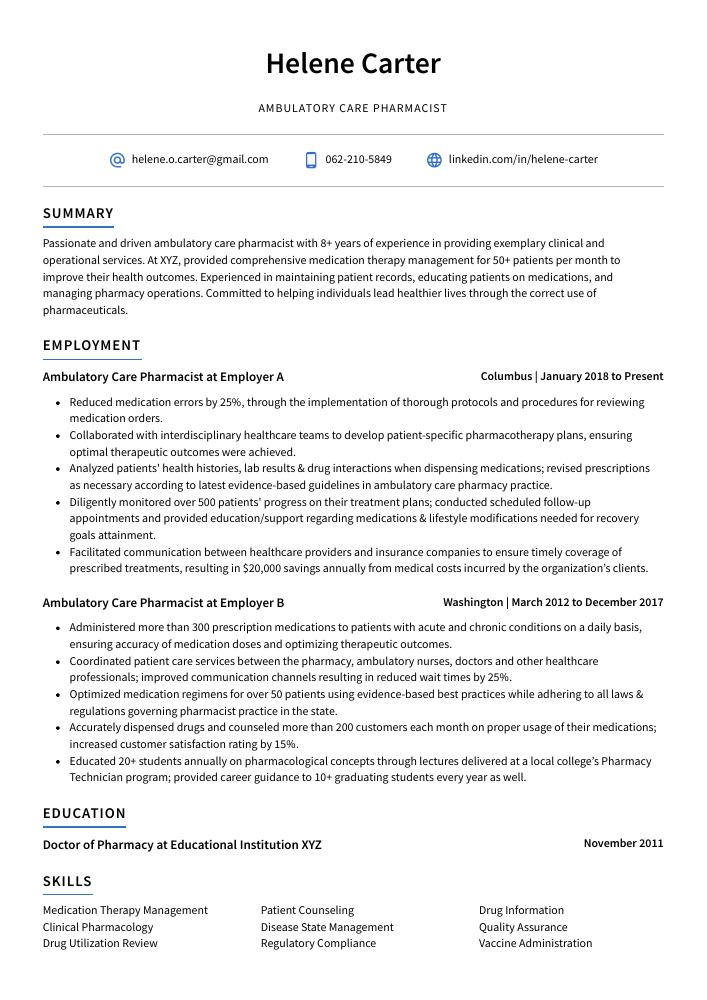Ambulatory Care Pharmacist Resume Guide
Ambulatory care pharmacists provide medication therapy management and primary care services to patients in an outpatient setting. They counsel patients on the safe use of medications, advise healthcare providers on drug selection, monitor patient progress, review medical records for drug interactions and allergies, administer vaccinations and injections when needed, and manage pharmacy inventory.
You have the clinical and operational expertise to be a leader in ambulatory care pharmacy. However, hiring managers don’t know that yet. To get their attention, you must write an impressive resume outlining your qualifications and experience.
This guide will walk you through the entire process of creating a top-notch resume. We first show you a complete example and then break down what each resume section should look like.
Table of Contents
The guide is divided into sections for your convenience. You can read it from beginning to end or use the table of contents below to jump to a specific part.
Ambulatory Care Pharmacist Resume Sample
Helene Carter
Ambulatory Care Pharmacist
[email protected]
062-210-5849
linkedin.com/in/helene-carter
Summary
Passionate and driven ambulatory care pharmacist with 8+ years of experience in providing exemplary clinical and operational services. At XYZ, provided comprehensive medication therapy management for 50+ patients per month to improve their health outcomes. Experienced in maintaining patient records, educating patients on medications, and managing pharmacy operations. Committed to helping individuals lead healthier lives through the correct use of pharmaceuticals.
Experience
Ambulatory Care Pharmacist, Employer A
Columbus, Jan 2018 – Present
- Reduced medication errors by 25%, through the implementation of thorough protocols and procedures for reviewing medication orders.
- Collaborated with interdisciplinary healthcare teams to develop patient-specific pharmacotherapy plans, ensuring optimal therapeutic outcomes were achieved.
- Analyzed patients’ health histories, lab results & drug interactions when dispensing medications; revised prescriptions as necessary according to latest evidence-based guidelines in ambulatory care pharmacy practice.
- Diligently monitored over 500 patients’ progress on their treatment plans; conducted scheduled follow-up appointments and provided education/support regarding medications & lifestyle modifications needed for recovery goals attainment.
- Facilitated communication between healthcare providers and insurance companies to ensure timely coverage of prescribed treatments, resulting in $20,000 savings annually from medical costs incurred by the organization’s clients.
Ambulatory Care Pharmacist, Employer B
Washington, Mar 2012 – Dec 2017
- Administered more than 300 prescription medications to patients with acute and chronic conditions on a daily basis, ensuring accuracy of medication doses and optimizing therapeutic outcomes.
- Coordinated patient care services between the pharmacy, ambulatory nurses, doctors and other healthcare professionals; improved communication channels resulting in reduced wait times by 25%.
- Optimized medication regimens for over 50 patients using evidence-based best practices while adhering to all laws & regulations governing pharmacist practice in the state.
- Accurately dispensed drugs and counseled more than 200 customers each month on proper usage of their medications; increased customer satisfaction rating by 15%.
- Educated 20+ students annually on pharmacological concepts through lectures delivered at a local college’s Pharmacy Technician program; provided career guidance to 10+ graduating students every year as well.
Skills
- Medication Therapy Management
- Patient Counseling
- Drug Information
- Clinical Pharmacology
- Disease State Management
- Quality Assurance
- Drug Utilization Review
- Regulatory Compliance
- Vaccine Administration
Education
Doctor of Pharmacy
Educational Institution XYZ
Nov 2011
Certifications
Board Certified Ambulatory Care Pharmacist (BCACP)
Board of
May 2017
1. Summary / Objective
A resume summary/objective is the first thing a potential employer will read, so it’s important to make sure you write one that stands out. As an ambulatory care pharmacist, your summary should highlight your expertise in providing patient-centered medication therapy management services and how you have successfully implemented innovative strategies to improve patient outcomes. You could also mention any certifications or awards you’ve received related to this field as well as any special skills such as fluency in multiple languages.
Below are some resume summary examples:
Reliable ambulatory care pharmacist with 5+ years of experience in retail and hospital settings. Expertise in medication therapy management, disease state education, drug information research, and patient counseling. At XYZ Clinic, quickly identified prescription discrepancies resulting in cost savings of $65K annually. Dedicated to providing optimal pharmaceutical services that improve the quality of life for patients while ensuring compliance with regulations.
Driven ambulatory care pharmacist with 7 years of experience in a retail setting. Skilled at managing medication therapies for patients, including creating and implementing treatment plans according to established protocols. Exceptional knowledge of pharmacology principles, drug interactions, and dosing requirements. At XYZ Pharmacy increased patient satisfaction ratings by 25% through educating them about their medications and providing personalized service.
Detail-oriented ambulatory care pharmacist with 5+ years of experience in dispensing medications, providing patient education and counseling, handling drug inventory management. At XYZ Pharmacy, managed the development of new pharmacy services for chronic disease management. Successfully implemented medication reconciliation to reduce adverse drug events by 30%. Experienced in developing protocols and training materials for pharmacists and technicians.
Professional Ambulatory Care Pharmacist with 3+ years of experience in providing high-quality pharmaceutical care. Outstanding knowledge of medications and their effects, as well as current industry trends in pharmacy practice. Proven track record for increasing patient satisfaction through excellent customer service and advice on medication therapy management strategies. Seeking to join ABC Health System to provide superior ambulatory care services.
Proficient and detail-oriented ambulatory care pharmacist with 8+ years of experience in pharmaceutical services, review and verification of drug orders, patient counseling and education. Seeking to leverage comprehensive knowledge base at ABC Pharmacy to provide the highest quality of pharmacy services for patients. At XYZ Health Center, significantly reduced medication errors by 20%, resulting in improved safety outcomes for clients.
Hard-working ambulatory care pharmacist with 8+ years of experience providing safe and effective medication management services to patients in diverse settings. Proven record of effectively educating patients on the right usage, dosage, and side effects of medications while minimizing adverse drug events. Seeking an opportunity at ABC Clinic to improve patient outcomes through evidence-based practice and expertise in pharmacotherapy.
Determined ambulatory care pharmacist with 5+ years of experience in an outpatient setting. Skilled at developing and implementing medication-therapy management plans for patients, collaborating on interdisciplinary teams to provide patient-centered care, and efficiently managing time to meet multiple deadlines. Passionate about helping ABC Health Center deliver quality healthcare services by leveraging evidence-based approaches.
Accomplished Ambulatory Care Pharmacist with 6+ years of experience in ambulatory care settings. Skilled at providing patient-centered pharmaceutical services to ensure optimal medication therapy outcomes. At XYZ, developed and implemented a pharmacy program that improved the efficiency of their hospital’s ambulatory care service by 15%. Achieved Certification in Clinical Cardiology from ABC University.
2. Experience / Employment
The employment (or experience) section is where you talk about your professional history. It should be written in reverse chronological order, meaning that the most recent job is listed first.
When listing what you did at each role, stick to bullet points as much as possible; this makes it easier for the reader to digest the information quickly and efficiently. You want to provide detail when writing out these bullets, explaining what you did and any results or accomplishments achieved while doing so.
For example, instead of saying “Provided medication counseling,” you could say “Counseled over 500 patients on their medications per month through one-on-one consultations and group presentations.”
To write effective bullet points, begin with a strong verb or adverb. Industry specific verbs to use are:
- Dispensed
- Monitored
- Compounded
- Educated
- Reconciled
- Administered
- Collaborated
- Supervised
- Analyzed
- Evaluated
- Documented
- Researched
- Managed
- Assessed
Other general verbs you can use are:
- Achieved
- Advised
- Compiled
- Coordinated
- Demonstrated
- Developed
- Expedited
- Facilitated
- Formulated
- Improved
- Introduced
- Mentored
- Optimized
- Participated
- Prepared
- Presented
- Reduced
- Reorganized
- Represented
- Revised
- Spearheaded
- Streamlined
- Structured
- Utilized
Below are some example bullet points:
- Improved quality of care and patient safety by assessing medication regimens for over 400 ambulatory care patients each week, resulting in a 10% decrease in adverse drug events.
- Assessed prescription orders accurately to ensure that treatments were appropriate and effective; provided advice on alternative therapies where applicable, leading to an increase in successful outcomes by 8%.
- Expedited the flow of medications from ordering through delivery with accurate labeling techniques and documentation practices; improved supply chain management processes to reduce inventory waste by 25%.
- Structured the workflow for pharmacy technicians & interns efficiently so as to optimize time usage and maximize productivity levels, thus increasing customer satisfaction scores up from 65-80%.
- Efficiently managed insurance authorizations & reimbursements across all areas of pharmacological services while providing a high level of customer service at all times.
- Effectively managed medication orders for over 500 ambulatory care patients, ensuring accuracy and safety of patient treatment.
- Introduced a new process to streamline the prescription refill system, reducing wait times by 40% and increasing customer satisfaction ratings by 20%.
- Prepared sterile intravenous solutions in accordance with USP 797 regulations; checked all medications prior to dispensing for quality assurance purposes.
- Reconciled pharmacy inventory on a weekly basis resulting in an average savings of $1,500 per month through improved stock management practices.
- Participated actively as part of interdisciplinary teams providing education programs on safe drug usage and side-effects prevention techniques to patients in the community setting.
- Compiled patient drug histories, reconciled medications and verified allergies to ensure accurate dosing for over 500 ambulatory care patients each month; improved patient safety rate by 20%.
- Presented clear, concise medication education to patients on the use of their prescription drugs and OTC products; successfully coached an average of 75+ individuals per week on proper medication management.
- Actively collaborated with physicians in order to provide optimal pharmaceutical care for chronic diseases such as diabetes, hypertension and asthma; reduced hospital readmission rates by 10% in the last quarter.
- Demonstrated experience utilizing electronic medical records (EMR), pharmacy information systems (PIS) & automated dispensing technology when preparing medicines for patients’ discharge or pick up from pharmacies/hospitals.
- Researched new therapeutic areas and studied literature updates related to pharmacotherapy while keeping current with regulatory standards, new product releases and recalls affecting practice area(s).
- Represented hospital pharmacy department in a range of ambulatory care activities for over 500 patients, providing safe and quality medication services.
- Mentored new staff members on various aspects of pharmacological practice, resulting in improved patient satisfaction scores by 10%.
- Reorganized hospital storage areas to better organize medications and medical supplies; decreased wasted inventory costs by $4,000 annually.
- Utilized electronic systems like eMAR & EHR to accurately enter prescription orders with 99% accuracy rate; reduced risk of drug dispensing errors significantly within the unit.
- Thoroughly reviewed all incoming prescriptions against existing records before filling orders to ensure compliance with state regulations; identified and prevented duplicate therapy issues in over 200 cases per month on average.
- Compounded over 200 medications per shift for ambulatory care patients, ensuring accuracy and adherence to all safety protocols; decreased medication errors by 15%.
- Consistently met productivity targets by filling an average of 75 prescriptions daily with a 99% accuracy rate in over 3 years as an Ambulatory Care Pharmacist.
- Supervised the training of junior pharmacists on pharmacy operations, compound batching processes, inventory cycle counts and other related duties; mentored 5 new hires successfully.
- Spearheaded the implementation of a streamlined ordering system which allowed pharmacies to keep track of their stock levels more efficiently while reducing wastage costs by $7000 annually.
- Documented patient profiles accurately into electronic health records (EHR) systems and kept detailed records regarding therapeutic substitutions/interchanges made when dispensing drugs for improved record-keeping purposes.
- Evaluated and dispensed medications for ambulatory care patients, ensuring prescriptions were filled accurately and in adherence to all safety protocols; achieved a 99.9% accuracy rate on 500+ medication orders processed daily.
- Achieved cost savings of $10K per month by proactively identifying opportunities to switch existing medications to lower-cost generics or therapeutic alternatives where clinically appropriate.
- Successfully managed drug inventory levels across 5 pharmacies, maintaining optimal stock levels while reducing overstock incidents by 20%.
- Developed an online database of patient forms and documents that included medical history records as well as information about allergies, current/prior treatments, adverse reactions and other relevant data; streamlined manual processes with the implementation of this system resulting in a 10% reduction in processing time for each order received from physicians’ offices.
- Advised patients on dosage instructions & side effects associated with prescribed drugs; closely monitored their progress through follow up calls & visits at least once every two weeks.
- Independently formulated and dispensed medication in an ambulatory care setting with accuracy, successfully filling over 500 prescriptions per week.
- Facilitated patient education on medications, diet, exercise and lifestyle changes; reduced incidences of drug-related complications by 17%.
- Dispensed drugs prescribed by physicians and other health practitioners to patients while ensuring compliance with state regulations; conducted regular inventory checks to maintain optimal stock levels at all times.
- Monitored the therapeutic effectiveness of drugs taken by patients through evaluation of laboratory tests results; provided clinical advice regarding potential adverse reactions or interactions between medications as needed.
- Developed processes that streamline dispensing procedures for efficient performance of duties daily; saved up to 4 hours a day leading to improved operational efficiency within the pharmacy team overall.
3. Skills
Skill requirements will differ from employer to employer – this can easily be determined via the job advert. Organization ABC may be looking for someone with knowledge of a specific EMR system, while Organization XYZ may require the candidate to have experience in working with Medicare Part D.
It is important to tailor your skills section accordingly due to the prevalence of applicant tracking systems these days. These computer programs scan resumes for certain keywords before passing them on to a human recruiter or hiring manager.
In addition, you should also discuss some of your most relevant qualifications and abilities in other areas such as the summary statement or experience section. This will give employers more insight into what makes you an ideal fit for their organization’s ambulatory care pharmacist role.
Below is a list of common skills & terms:
- Clinical Pharmacology
- Compounding Medications
- Disease State Management
- Drug Information
- Drug Utilization Review
- Medication Therapy Management
- Patient Counseling
- Quality Assurance
- Regulatory Compliance
- Vaccine Administration
4. Education
Including an education section on your resume will depend on how far along you are in your career. If you just graduated and have no work experience, your education should be mentioned below your resume objective. However, if you have significant work experience to showcase, it may not be necessary to include an education section at all.
If an educational background is included, make sure to mention courses or subjects related specifically to the ambulatory care pharmacist role that you are applying for.
Doctor of Pharmacy
Educational Institution XYZ
Nov 2011
5. Certifications
Certifications are a great way to demonstrate your knowledge and proficiency in a particular field. Employers will be impressed by the fact that you have taken the time and effort to become certified, as it shows dedication and commitment.
Include any certifications relevant to the job you are applying for on your resume so employers can quickly see what qualifications you possess. This is especially important if they require specific skills or expertise from applicants.
Board Certified Ambulatory Care Pharmacist (BCACP)
Board of
May 2017
6. Contact Info
Your name should be the first thing a reader sees when viewing your resume, so ensure its positioning is prominent. Your phone number should be written in the most commonly used format in your country/city/state, and your email address should be professional.
You can also choose to include a link to your LinkedIn profile, personal website, or other online platforms relevant to your industry.
Finally, name your resume file appropriately to help hiring managers; for Helene Carter, this would be Helene-Carter-resume.pdf or Helene-Carter-resume.docx.
7. Cover Letter
Providing a cover letter with your job application is often the key to standing out from the competition. It’s a great opportunity for you to showcase your personality and explain why you’re an ideal candidate for the role.
Cover letters are usually made up of 2-4 paragraphs that go beyond what is stated in your resume, such as explaining why you’re passionate about this particular position or how it relates to any relevant experience or education qualifications. They should be tailored specifically towards each individual job opening and provide recruiters with further insight into who you are as a professional.
Below is an example cover letter:
Dear Nella,
I am writing to apply for the Ambulatory Care Pharmacist position at XYZ Hospital. With experience in both hospital and retail settings, I have a well-rounded understanding of pharmacy operations. My patient-centered approach and dedication to providing quality care makes me an excellent fit for this role.
In my current position as an ambulatory care pharmacist at ABC Clinic, I provide direct patient care services such as medication therapy management (MTM), disease state management (DSM), and immunizations. I also work closely with the clinic’s interdisciplinary team to develop individualized treatment plans that optimize patient outcomes. Through my efforts, I have been able to increase patient satisfaction scores by 10%.
Prior to working in ambulatory care, I spent 4 years working as a staff pharmacist in a high-volume retail pharmacy. In this role, I gained valuable experience filling prescriptions quickly and accurately while providing excellent customer service. My time in retail has also given me a strong understanding of third-party payers and prior authorization processes—knowledge that would be beneficial in an ambulatory care setting where insurance approval is often needed before treatments can be rendered.
I am confident that my skills and experiences will contribute to the success of your organization. I look forward to speaking with you soon about how I could benefit XYZ Hospital as your next Ambulatory Care Pharmacist.
Sincerely,
Helene
Ambulatory Care Pharmacist Resume Templates
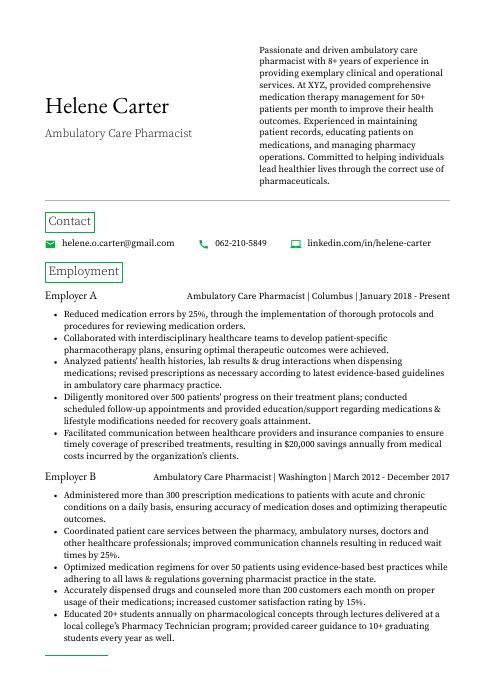 Quokka
Quokka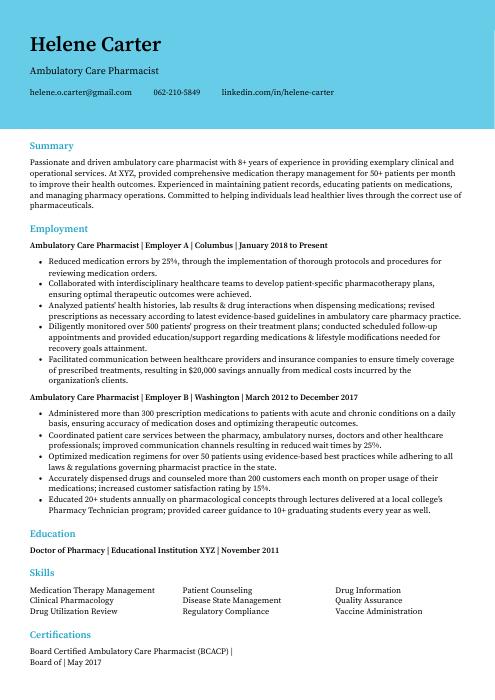 Dugong
Dugong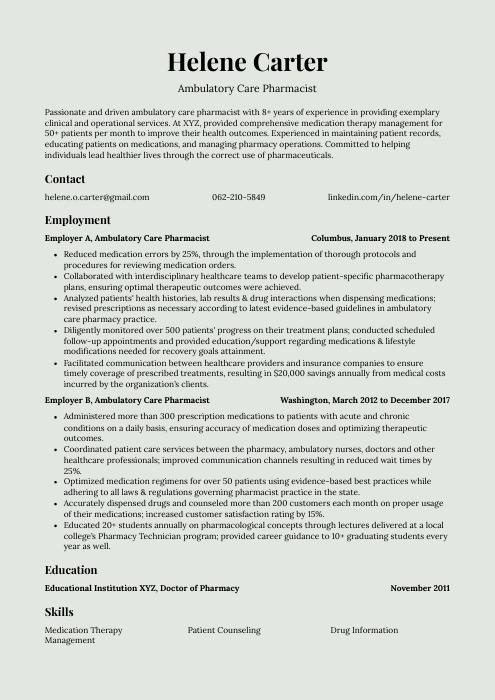 Saola
Saola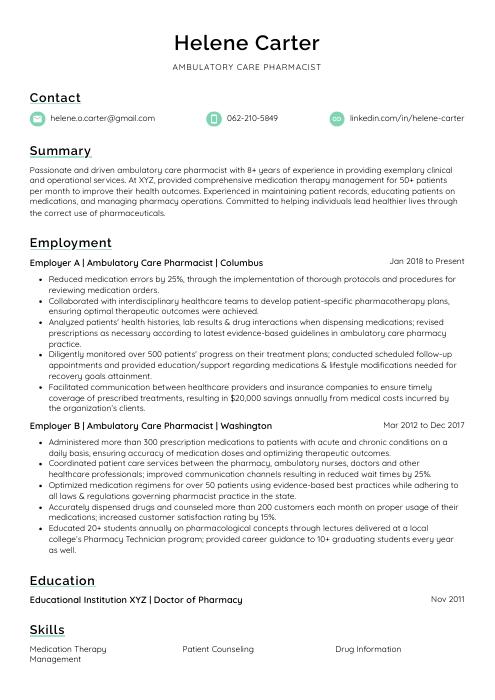 Lorikeet
Lorikeet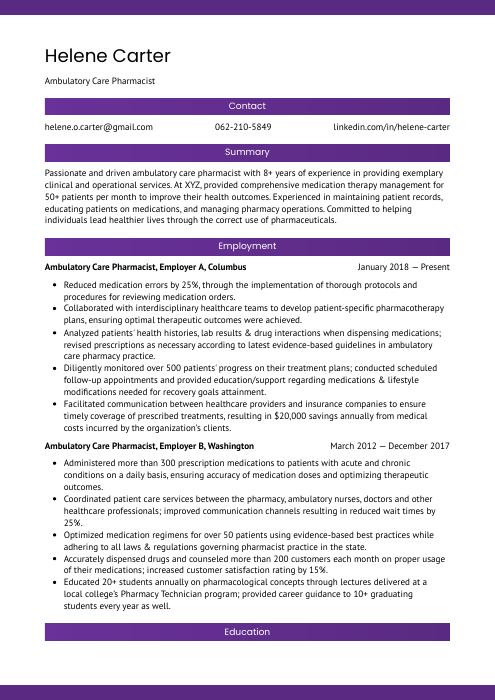 Jerboa
Jerboa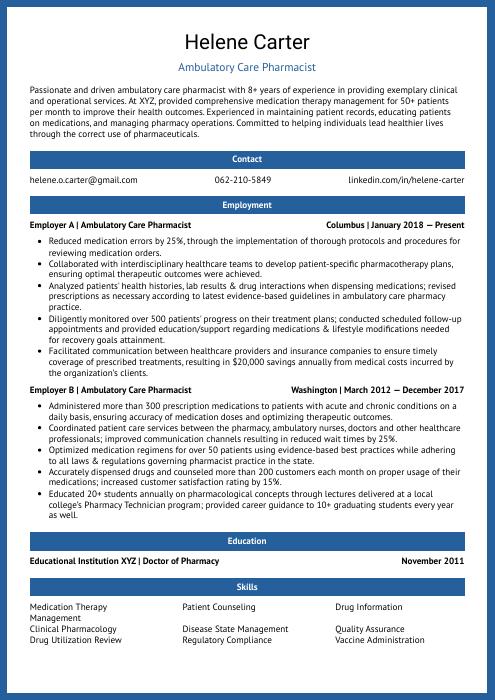 Ocelot
Ocelot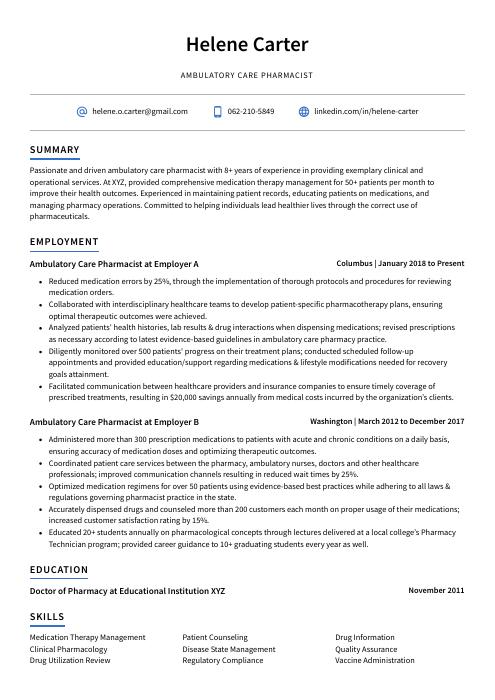 Axolotl
Axolotl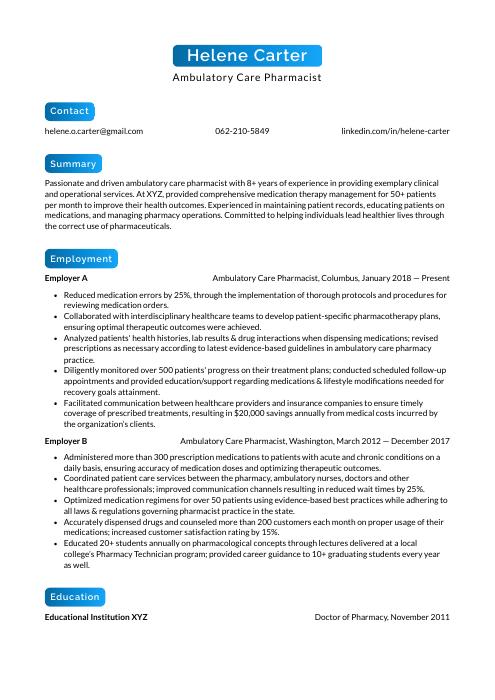 Kinkajou
Kinkajou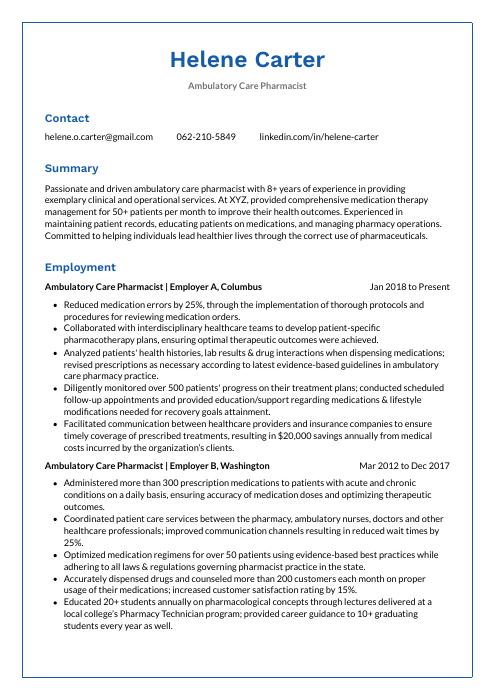 Markhor
Markhor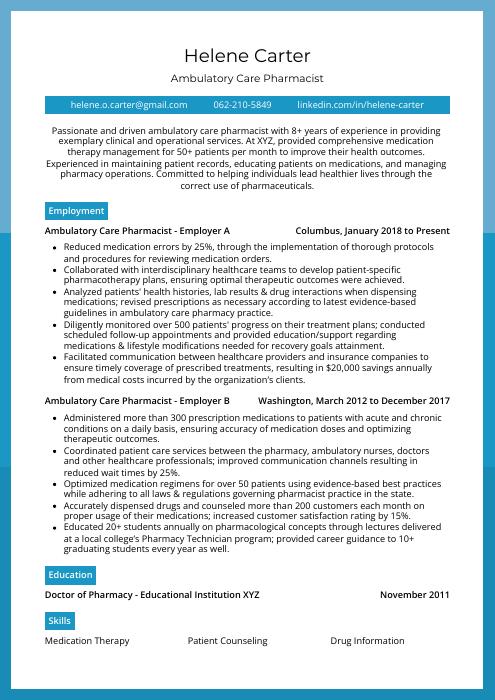 Rhea
Rhea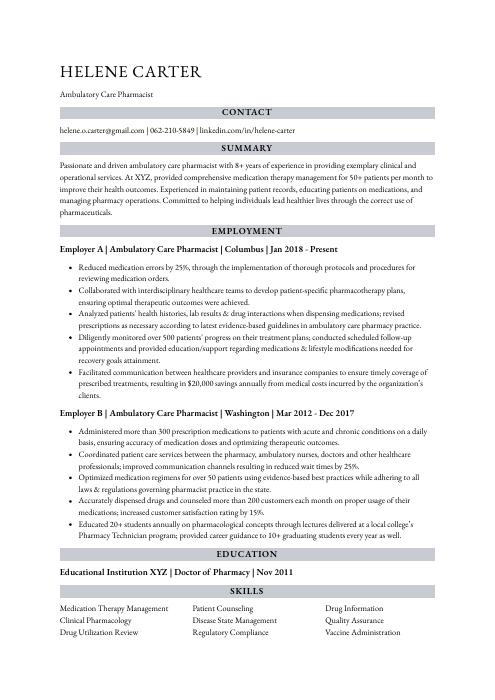 Numbat
Numbat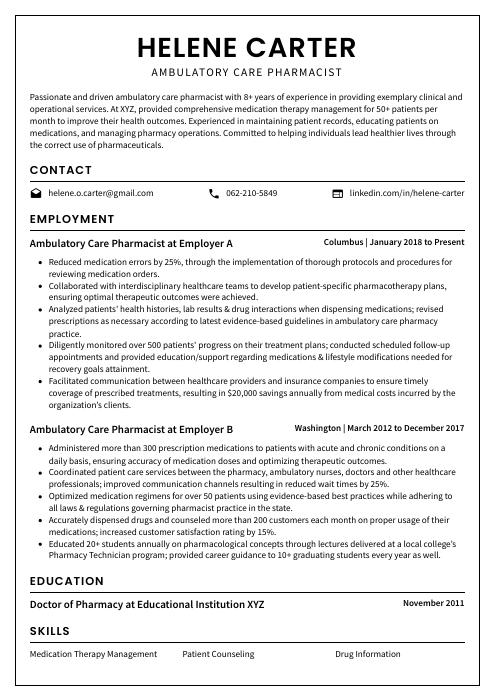 Cormorant
Cormorant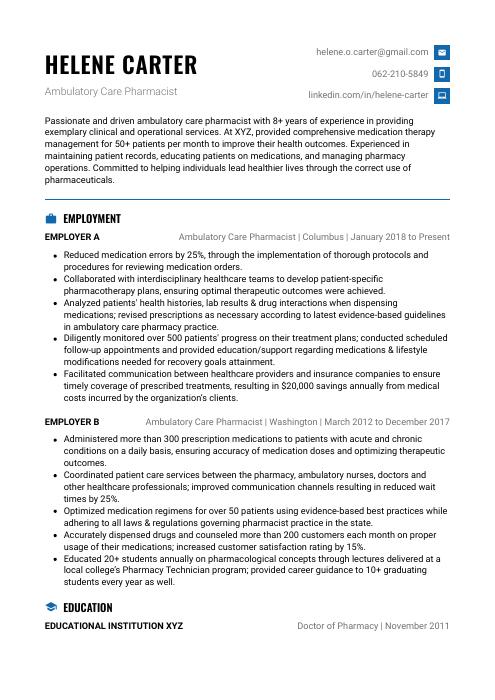 Echidna
Echidna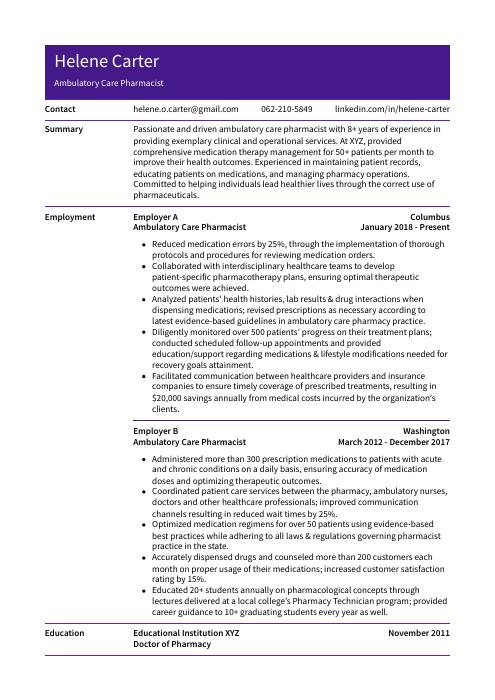 Pika
Pika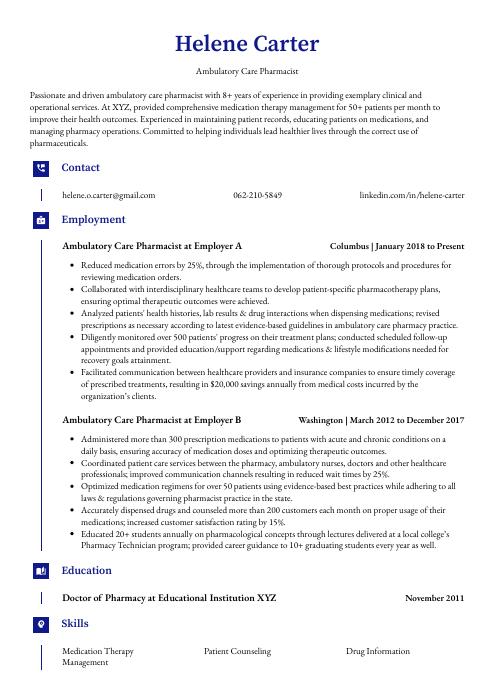 Gharial
Gharial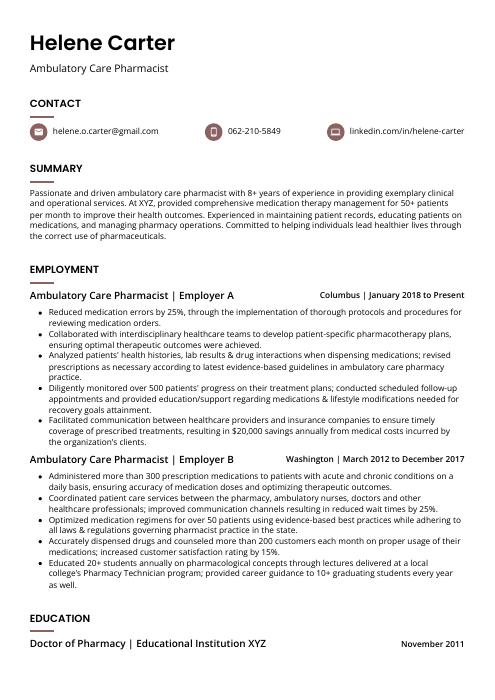 Fossa
Fossa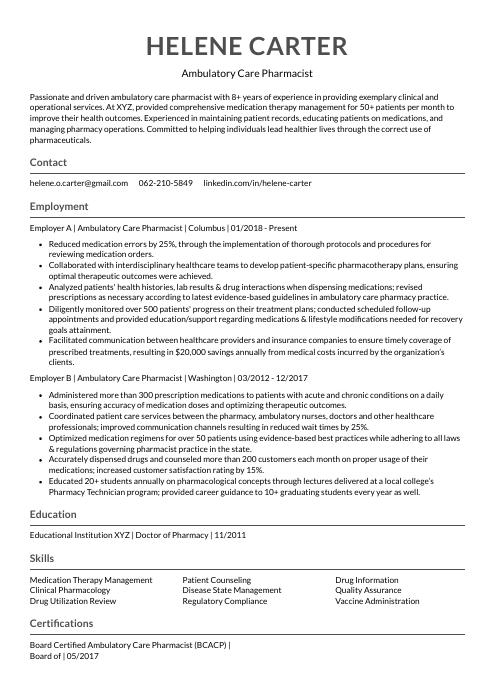 Indri
Indri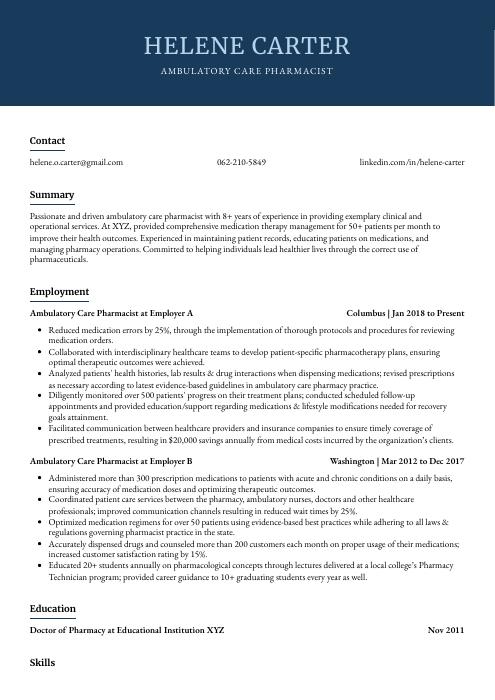 Bonobo
Bonobo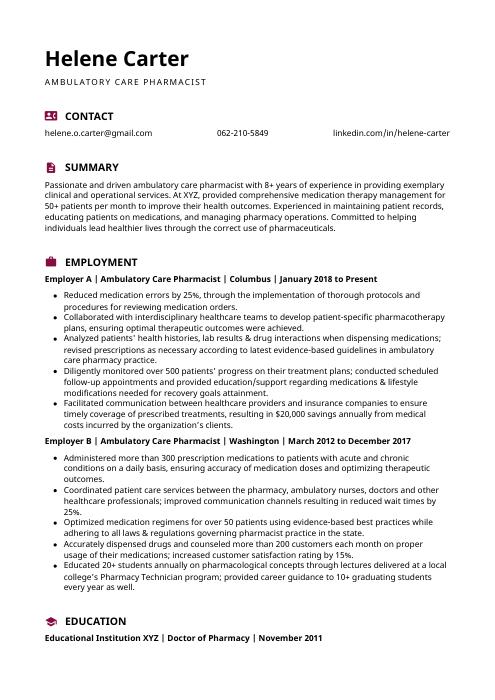 Hoopoe
Hoopoe Rezjumei
Rezjumei
